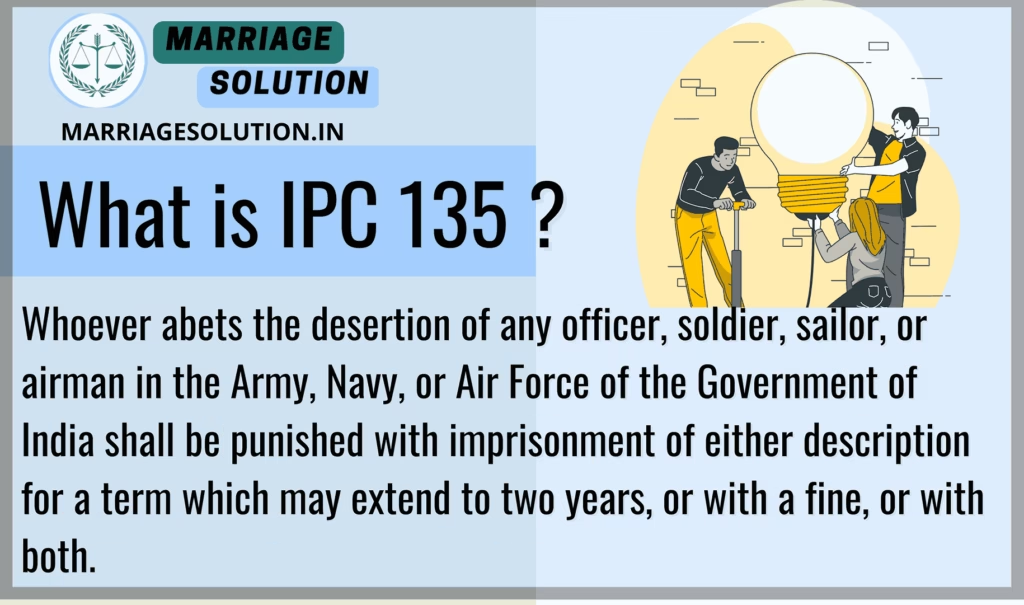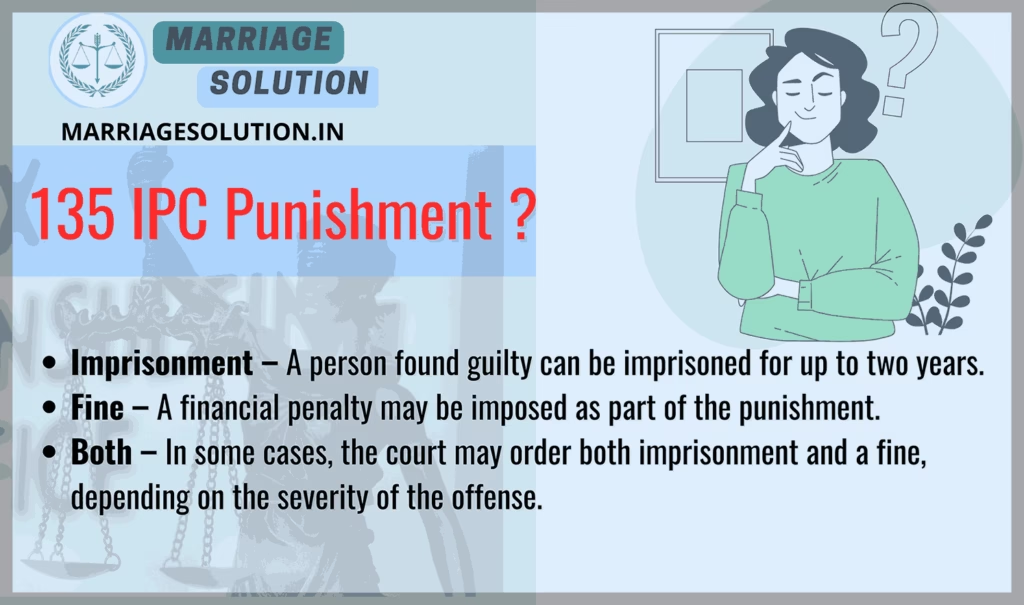Introduction of IPC 135
IPC 135 deals with the offense of abetting desertion by military personnel, including soldiers, sailors, and airmen. If any person encourages or assists a member of the Army, Navy, or Air Force in leaving their service without authorization, they can be punished under this section. The law ensures discipline in the armed forces and prevents security risks.
What is IPC Section 135 ?
Whoever abets the desertion of any officer, soldier, sailor, or airman in the Army, Navy, or Air Force of the Government of India shall be punished with imprisonment of either description for a term which may extend to two years, or with a fine, or with both.

Section 134 IPC in Simple Points
1. Meaning of Abetment Under IPC 135
Abetment means actively supporting or encouraging someone to commit an illegal act. In IPC 135, abetment refers to helping a soldier, sailor, or airman leave their post or duty without permission. This can be done through direct assistance, persuasion, or indirect influence. The section ensures that no one disrupts military discipline by encouraging desertion.
2. Punishment for Abetting Desertion
If a person is found guilty of abetting desertion, they can face imprisonment of up to two years, a fine, or both. The severity of punishment depends on the extent of involvement in the act. The law takes strict action to maintain military order and prevent unlawful desertion.
3. Difference Between Absence and Desertion
There is a difference between being absent without leave (AWOL) and desertion. AWOL refers to temporary absence, while desertion indicates an intention to permanently leave the service without permission. IPC 135 punishes those who assist military personnel in permanently abandoning their duties.
4. Importance of Military Discipline
Military personnel are expected to remain committed to their duties to maintain national security. If soldiers desert their posts, it can weaken the defense system. IPC 135 ensures that individuals do not interfere with military discipline by promoting or assisting desertion.
5. Who Can Be Punished Under IPC 135?
Both civilians and military personnel can be charged under IPC 135 if they assist in desertion. This means family members, friends, or fellow soldiers who encourage a person to leave their duty unlawfully can be held accountable. The law applies to all individuals who take part in abetting desertion.
IPC Section 135 Overview
IPC 135 deals with the offense of helping or encouraging a soldier, sailor, or airman in the Indian Armed Forces to abandon their duty unlawfully. If a person assists or influences military personnel to desert their service, they can be punished under this law. The punishment includes imprisonment for up to two years, a fine, or both.
IPC 135: Abetment of Desertion of Soldier, Sailor, or Airman – 10 Key Points
1. Meaning of Abetment in IPC 135
Abetment refers to encouraging or helping someone commit an offense. Under IPC 135, if any person assists, supports, or persuades a soldier, sailor, or airman to leave their service without permission, it is considered a crime. The law applies to civilians and military personnel who influence or convince defense personnel to desert their duties. The act of abetment can be through words, actions, or any other means.
2. Importance of Military Discipline
The military is a crucial pillar of national security. Soldiers, sailors, and airmen are expected to follow strict discipline and remain loyal to their duty. Any encouragement to desert can weaken the defense system and create security risks. IPC 135 ensures that people do not disrupt military discipline by persuading personnel to leave their service unlawfully.
3. Applicability to Civilians and Military Personnel
IPC 135 is not limited to military personnel; it applies to civilians as well. If a person outside the military convinces or helps a soldier, sailor, or airman to desert, they are equally liable under this law. This ensures that external influences do not affect the commitment and loyalty of defense personnel.
4. Punishment for Abetment of Desertion
Anyone found guilty of abetting desertion under IPC 135 can be punished with imprisonment of up to two years, a fine, or both. The severity of the punishment depends on the nature of abetment and its impact on national security. This provision ensures strict action against those who encourage desertion.
5. Definition of Desertion
Desertion refers to an act where a soldier, sailor, or airman leaves their post or duty without permission and does not intend to return. It is different from being absent without leave (AWOL), as desertion involves a permanent decision to abandon duty. IPC 135 focuses on punishing those who help or encourage such desertion.
6. Impact on National Security
If military personnel desert their duties, it weakens the defense system of the country. Encouraging desertion can lead to serious consequences, including reduced manpower, loss of security, and potential threats to national safety. IPC 135 aims to prevent such actions and maintain a strong defense force.
7. How Abetment is Proven in Court
To convict someone under IPC 135, the prosecution must prove that the accused actively encouraged, supported, or helped the military personnel in deserting. This can be shown through direct evidence like messages, financial help, or recorded conversations. Indirect influence, such as spreading misinformation about the military, can also be considered in some cases.
8. Difference Between Desertion and Resignation
A soldier, sailor, or airman can resign legally by following the proper procedure. However, desertion is an illegal act where they leave without permission. IPC 135 punishes only those who encourage military personnel to desert, not those who help with legal resignations. This ensures that lawful exits from the service are not affected.
9. Role of Family and Friends in Desertion Cases
Sometimes, family members or friends may unknowingly influence military personnel to leave their service due to personal reasons. If proven that they actively encouraged desertion, they can be punished under IPC 135. However, general concerns or emotional appeals do not count as abetment unless they involve direct encouragement to desert.
10. Preventive Measures and Legal Awareness
To prevent violations of IPC 135, awareness about military laws and responsibilities should be promoted. Soldiers should be educated about the legal consequences of desertion and the punishments for those who encourage it. Civilians should also be informed about the legal risks of abetting desertion to avoid unintended violations of this law.
This law plays a vital role in maintaining discipline in the armed forces and protecting national security by ensuring that no one encourages military personnel to leave their duties illegally.
Example 1: Civilian Encouraging Desertion
A man persuades his brother, who is serving in the Indian Army, to leave his duty without permission and return home due to personal family issues. He also arranges transportation for him to escape the military base. This act is considered abetment of desertion under IPC 135, and the civilian can be punished for his role in assisting the soldier’s unlawful departure.
Example 2: Fellow Soldier Helping Another Soldier to Desert
A naval officer helps his friend, another sailor, escape from duty by providing him with false identity papers and guiding him to a different city. The naval officer knowingly aids in desertion, making him guilty under IPC 135. He can face imprisonment, a fine, or both.
Section 135 IPC case laws
1. State vs. Ramesh Kumar (2015)
Case Details: A soldier influenced his colleagues to attack their commander over personal grievances. During duty, one soldier physically assaulted the commander.
Result: The court found the abettor guilty under IPC 134 and sentenced him to five years imprisonment with a fine of ₹50,000.
2. Union of India vs. Rajiv Singh (2012)
Case Details: A naval officer encouraged a sailor to strike a senior officer during a dispute. The sailor committed the act.
Result: The abettor was sentenced to four years in jail, and the attacker received seven years of imprisonment under IPC 134 and other sections.
3. Air Force Authority vs. Surendra Sharma (2020)
Case Details: A group of airmen planned an attack on their superior officer but did not execute it. However, their leader was found guilty of inciting them.
Result: The court ruled that even planning an assault was enough for conviction under IPC 134 and sentenced the leader to three years in prison.
4. Indian Army vs. Naresh Yadav (2018)
Case Details: A soldier ordered a junior to harm a senior officer during training. The junior soldier executed the attack.
Result: The senior officer suffered serious injuries. The abettor was sentenced to six years imprisonment and the actual attacker received seven years of jail time.
5. State vs. Anil Chauhan (2017)
Case Details: A navy officer encouraged lower-ranked sailors to physically harm their captain due to strict discipline rules. The act was carried out.
Result: The abettor was sentenced to seven years imprisonment and fined ₹1 lakh. The attackers received separate sentences under IPC 134.
IPC 135 Punishment
- Imprisonment – A person found guilty can be imprisoned for up to two years.
- Fine – A financial penalty may be imposed as part of the punishment.
- Both – In some cases, the court may order both imprisonment and a fine, depending on the severity of the offense.

135 IPC bailable or not ?
IPC 135 is a bailable offense, meaning the accused can seek bail while the case is under trial.
Section 135 IPC in short information
| IPC Section | Offense | Punishment | Bailable/Non-Bailable | Cognizable/Non-Cognizable | Trial |
|---|---|---|---|---|---|
| IPC 135 | Abetment of desertion by a soldier, sailor, or airman | Up to 2 years imprisonment, fine, or both | Bailable | Cognizable | Magistrate |
135 IPC FAQs
What is IPC 135?
IPC 135 punishes anyone who helps or encourages a soldier, sailor, or airman to desert their duty.
What is the punishment under IPC 135?
The punishment includes imprisonment for up to two years, a fine, or both.
Is IPC 135 a cognizable offense?
Yes, IPC 135 is a cognizable offense, meaning police can register a case and start an investigation without prior court approval.
Who can be punished under IPC 135?
Both civilians and military personnel who abet desertion can be punished under this section.
Can the accused get bail in IPC 135?
Yes, IPC 135 is a bailable offense, so the accused can apply for bail.
If you need support with court proceedings or any other legal matters, don’t hesitate to reach out for assistance.
Court or any other marriage-related issues, our https://marriagesolution.in/lawyer-help-1/ website may prove helpful. By completing our enquiry form and submitting it online, we can provide customized guidance to navigate through the process effectively. Don’t hesitate to contact us for personalized solutions; we are here to assist you whenever necessary!
